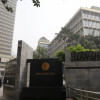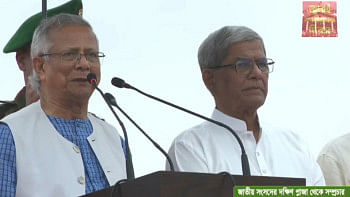Will the government touch the ‘untouchables’?

There are three kinds of criminals: those who break the law, those who bend/distort the law, and those who can change the law. The last group has such a grip on the government that they are able to make tailor-made legislations to suit themselves. They commit crimes that are not labelled as such, permitting them to masquerade as law-abiding citizens, all the while destroying our economy from within. Our banking sector is in the grip of such "law breakers."
Bangladesh's development story is one of inspiration. However, the loan default story is one of self-inflicted harm forced upon us by a powerful, self-serving, corrupt, and politically well-connected coterie.
The default-loan narrative has smeared our otherwise powerful story of graduation from the Least Developed Country (LDC) status. Our story of GDP, per capita income, export, and infrastructure growth, supplemented by an eye-catching performance of the agricultural sector, has indeed made us imitable to an extent.
So why has a strong government, with a courageous and go-getter prime minister, allowed a few extremely rich (how they became so is questionable to start with) loan defaulters to exploit their proximity to power, political connection and false narratives to mislead decision-makers to continuously relax banking rules, so that the big and habitual loan defaulters don't have to pay up?
There are two groups of loan-defaulters: the "wilful" ones, who plan from the very start how to use every trick in the book (more so those outside it) not to pay back their loans, and those who are thrown into being a loan defaulter due to genuine business reasons.
The latter group's default is something we should help them come out of. It is the former group – those who wilfully default as a part of their "strategy" and who should be punished – which is the subject of this column today.

It is quite unbelievable how the Bangladesh Bank, goaded by the finance ministry, changed its rules time and again, and how national and international banking norms were flouted to quench the unending greed of a section of our business community. For this community, banks are mere money-supplying machines from where a privileged few can extract as much money as they wish, without any consideration for either the depositors or the nation's interest.
Just in numbers, the story is astounding. In 1990, the total default loan was Tk 4,646 crore. Today, it is Tk 134,396 crore – a 29-time jump in 32 years. It is equivalent to the cost of constructing nearly five additional Padma Bridges. The default loan amounts to 9.36 percent of our total outstanding loans, meaning that nearly 10 percent of the loan-giving capacity of our banks is being held hostage by this group. An amount – 100, 50, and 20 percent of the loans, depending on how they have been classified – has to be kept away as "provisioning," thus further limiting the bank's flexibility to run their normal business.
The wilful defaulters' story shows over and over again how financial rules were repeatedly amended to favour big businesses and harm the medium and small enterprises. It shows how honest businesses were disincentivised, efficient enterprises were not given the support that they deserved, and how the practice of "not repaying bank loans" was turned (unbelievable as it may sound) into some sort of a perverted symbol of power.
Most importantly, it created a culture of defying age-old banking rules, weakening our banking system in general. It gave impunity to bad borrowers, making a mockery of business houses who honestly repaid their bank loans.
When big loan-takers were regularly allowed to reschedule what they owed to the banks, their political connection became apparent and the message became louder and louder that business acumen counted for far less than one's "connection" to make the right phone call to the right person at the right time.
Bank loans taken for investment in the economy were invested at "points of power," and rules magically changed and rescheduling at generous terms suddenly appeared on the horizon like "manna" from heaven. These changes pushed back the timeline of loan repayments further and further, turning the cost of borrowing into practically nothing. "Connection" reigned supreme, while banking rules lay in shambles.
Bluntly put, the default loan story is quite frightening. But sadder still is the story of how a well-entrenched government bent over backwards to pander to this group of defaulters and repeatedly gave them concessions, greatly harming the economy in general. All the steps that the government took, pushed through the central bank, were meant to help this coterie at the expense of financial discipline and, as such, at the cost of the general health of our economy.
Default loans also helped open up channels for money laundering, an affliction of serious consequence for our economy.
According to the Washington-based Global Financial Integrity (GFI) report of last December, "Bangladesh lost USD 8.27 billion every year on average between 2009 and 2018 resulting from mis-invoicing of value of imported and exported goods by traders to evade taxes and illegally move money across international borders." According to the above, we lost about USD 74 billion in nine years.
The GFI is clearly pointing its fingers to our import and export trade. Is it so difficult to fix? Don't other countries import and export? Do they lose billions in money laundering as we do? Or is it because we look the other way, as it benefits a certain class? (Whatever happened to NBR's plans to set up a "Transfer Pricing Cell"? Such a cell could track real-time global pricing and thus prevent over- and under-invoicing practice. We need costly software to do so. But isn't it worth buying when we lose more than USD 8.27 billion yearly? This is what we meant by "looking the other way.")
If we add to this the money laundered in other areas and the loss of remittance through hundi and other means, then we are talking about an additional few billion dollars of loss to our economy.
Today, we are knocking on the doors of the IMF and the World Bank for loans of USD 4.5 billion and USD 1 billion, respectively, and yet we have done next to nothing to prevent our gargantuan losses mentioned above.
Think of the strength our economy could have if we could prevent even a part of such losses. The big scams like Hallmark, Basic Bank (a particularly sad story of how a good bank was allowed to rot due to political connections), Padma Bank (previously The Farmers Bank), Crescent Group, Bismillah Group, etc, whose money has not been accounted for as yet, are all suspected to have laundered money to safer havens abroad.
The money launderers, the over- and under- "invoicers," the loan defaulters and others of their ilk form a powerful nexus who, over time, have become "untouchables." They have penetrated all the levels of our political and governance process, especially our parliament, political parties, bureaucracy, law enforcement, and the government, not to mention the media itself. This nexus is eating into our very entrails.
Whatever Bangladesh achieved, this group of wilful defaulters has eaten away at from inside, making us vulnerable to changes, many of them totally unpredictable.
The health of an economy is measured not only by how smoothly it sails when the sea is calm, but how it navigates when the sea is rough, especially during moments of severe turbulence. These "untouchables," by weakening our economy from within, are making it that much more difficult for us to weather the present international storm. It is time to touch these "untouchables."
Mahfuz Anam is the editor and publisher of The Daily Star.

 For all latest news, follow The Daily Star's Google News channel.
For all latest news, follow The Daily Star's Google News channel. 











Comments